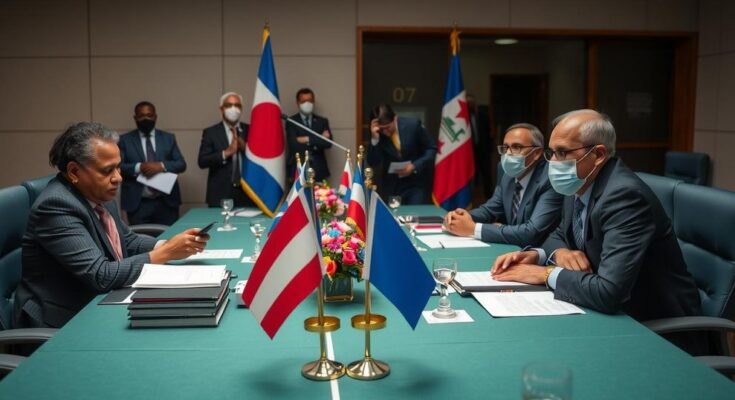The UN Security Council discussed escalating violence in eastern DRC, emphasizing the need for unity among regional leaders and comprehensive governance reforms. UN Special Representative Bintou Keita highlighted armed group activities in North Kivu and Ituri, ongoing humanitarian crises, and the urgent need to combat gender-based violence. A summit in December aims to further peace efforts with regional collaboration.
The United Nations Security Council convened to discuss the ongoing violence in eastern Democratic Republic of the Congo (DRC), as outlined by Bintou Keita, the UN Special Representative for the region. She reported on various sources of instability in North Kivu and Ituri provinces, exacerbated by armed groups such as the ADF, M23, CODECO, and Zaïre. While recognizing the commendable mediation efforts by Angola through the Luanda process, she emphasized the need for consistent international support and cohesive local initiatives to achieve lasting peace.
The DRC will host a pivotal summit on December 15, which aims to unify leadership from Angola, Congo, and Rwanda to further peace efforts. Ms. Keita stressed the importance of integrating recommendations from local communities, including women, to ensure effective governance reforms that address essential social services and public resource management.
Ms. Keita also shared developments following last year’s elections, which have prompted governance reforms intended to enhance citizen welfare and maintain stability. Progress has been noted in ceasefire agreements, particularly between the DRC and Rwanda, alongside the initiation of the Reinforced Ad-hoc Verification Mechanism (R-AVM) for monitoring compliance with ceasefire terms.
Despite these advancements, violence persists in eastern provinces, where M23’s control has expanded significantly. The ADF remains a serious threat with substantial civilian casualties reported in recent months. Moreover, while attacks from CODECO and Zaïre have decreased, safeguarding civilians continues to demand urgent attention, especially considering the connection between violence and exploitation of natural resources.
The humanitarian situation stands dire, with millions displaced due to conflict and epidemics. Fortunately, funding for the 2024 Humanitarian Response Plan surpasses last year’s allocations, reflecting an improved commitment to addressing these pressing needs. Amidst these crises, the increase in gender-based violence is alarming, with over 90,000 cases reported in 2023 alone, necessitating sustained efforts to combat this issue and support victims.
In conclusion, Ms. Keita underscored the necessity of prioritizing peace through concerted actions and cooperation among various stakeholders, particularly emphasizing the voices of women and marginalized groups in the DRC. Her remarks reflect a unified call for investment in initiatives aimed at restoring dignity and security for all DRC residents, particularly those affected by ongoing violence.
The Democratic Republic of the Congo has faced prolonged instability, particularly in its eastern provinces, where various armed groups persistently challenge state authority. The Congolese government has been engaged in a complex dialogue to ensure peace and rebuild the nation, focusing on constitutional reforms and local governance improvements. The international community, including the United Nations, has been actively involved in mediating these conflicts and supporting humanitarian efforts amid growing challenges such as climate change and the associated humanitarian crises.
In light of the Security Council’s discussions, it is essential for international and regional partners to fortify their support for peace initiatives in the DRC. The combined efforts of local communities, enhanced governance, and sustained humanitarian aid are vital to addressing the root causes of violence and establishing lasting stability. The emphasis on women’s voices in peacebuilding processes is especially crucial for creating inclusive and effective partnerships aimed at restoring safety and dignity in the DRC.
Original Source: news.un.org




